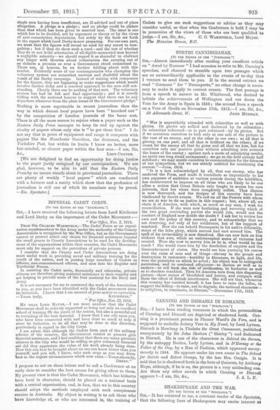SORTES CANNINGIANAE.
[To THE EDITOR OP THE " SPBOTATOR.n
Sm,—Almost immediately after reading your excellent article on " Awed by Rumour " I had occasion to refer to Mr. Canning's speeches, and chanced to stumble upon two passages which are so extraordinarily applicable to the events of to-day that I venture to send them to you. If in the second extract we read " Germans " for " ]3uonaparte," no other change is neces. sary to make it apply to current events. The first passage is from a speech in answer to Mr. Whitbread, who desired to belittle the achievements of Wellington and out down the Vote for the Army in Spain in 1810; the second from a speech on a Vote of Credit on November 17th, 1813.—I am, Sir, &c.,
" War is unavoidably attended with calamities as well as with ?lories. Its glories are sullied and darkened by its calamities ; its calamities redeemed—or in part redeemed—by its glories. But if we accustom ourselves to look only at one aide of the picture in the case of an enemy, and at the other in our own; at all that is gloomy on one part, and all that is brilliant on the other ; if we count for the enemy all that he gains and all that we lose, but for ourselves only our positive gains without admitting into account the losses of the enemy ; against such a mode of calculating results, no spirit can long stand unimpaired ; we go to the field already half subdued ; we may entitle ourselves to commendation for the fineness of our sympathies, but we are utterly unfitted for continuing the contest."—June, 1810.
" It is a fact acknowledged by all, that our enemy, who has enslaved the Press, and made it contribute so importantly to his own purposes of ambition at various periods during the hostilities, has endeavoured to impress on all those who are likely to be our allies a notion that Groat Britain only fought to secure her own interests, that her views wore completely selfish. That illusion is now destroyed, and the designs of this country have been vindicated by recent events. We call on all the Powers with whom we are at war to do us justice in this respect ; but, above all, we claim it of America, with which, as much as any man, I wish for reconciliation. If she were now hesitating and wavering which of the two great contending parties she would join, would not the conduct of England now decide the doubt ? I ask her to review her own and the policy of this country, and to acknowledge that we are deserving, not only of her confidence, but of the support of mankind. Now she can behold Buonaparte in his native deformity, stript of the false glory, which success had cast around him. The spell of his invincibility is now dissolved. She can now look on him without that awe, which an uninterrupted series of victories had created. Were she now to survey him as he is, what would be the result ? She would trace him by the desolation of empires and the dismemberment of states. She would see him pursuing his course over the ruins of men and of things—slavery to the people and destruction to commerce—hostility to literature, to light, and wore the principles on which he acted ; his object was to extinguish patriotism, and to confound allegiance—to darken as well as to enslave—to roll batik the tide of civilization, to barbarize as well as to desolate mankind. Then let America turn from this disgusting picture—those scenes of bloodshed and horror, and compare with them the effect of British interference. She will see that, whenever this country has exerted herself, it has been to raise the fallen, to support the falling—to raise, not to degrade, the national charaoter- to enlighten, to reanimate, to liberate."—November 17th, 1813.


































 Previous page
Previous page